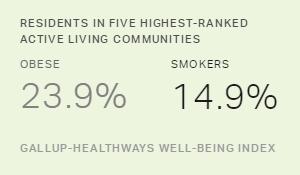BRUSSELS -- Low-income Britons' overall well-being score of 59.7 significantly lags behind that of the highest income group (72.5).
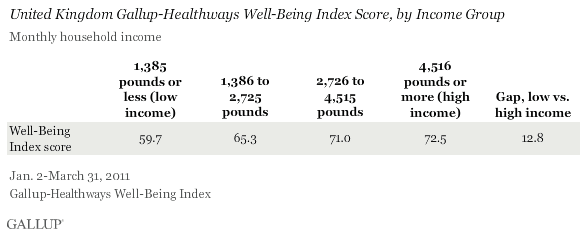
The Gallup-Healthways Well-Being Index in the United Kingdom consists of 55 individual items that collectively measure Britons' emotional, physical, and financial well-being. Low-income Britons are defined in this article as those who report a monthly income of 1,385 pounds or less.
A similar analysis of Well-Being Index data in the United States also finds lower income residents' well-being is much worse than that of those with higher incomes.
Low-income Britons' lower overall well-being reflects this group's poorer physical health, healthy behaviors, and access to certain basic necessities.
Chronic Health Problems More Prevalent Among Low-Income Britons
Britons in the lowest income group are more likely than those in higher income groups to say they have ever been diagnosed with each of the chronic conditions Gallup asks about, including high cholesterol, high blood pressure, diabetes, depression, and cancer.
More than half of those in the lowest income group report that they have had two or more of these health problems, compared with less than a third of those in the highest income group who say the same.
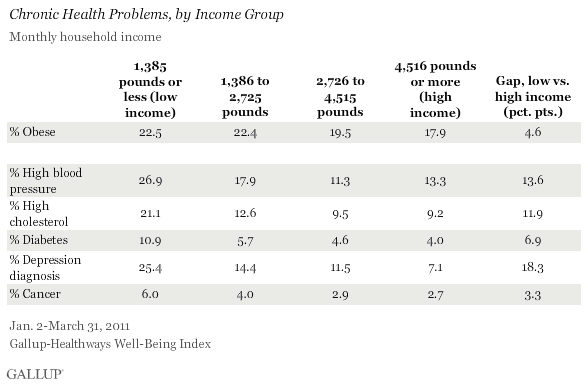
It is important to note that these differences hold when controlling for age.
Health Habits Likely Part of Low-Income Britons' Low Well-Being
Low-income Britons are significantly more likely to say they smoke than are their high-income counterparts. Additionally, those in the highest income group are much more likely than low-income Britons to report that they exercise regularly and eat five or more servings of fruits and vegetables four or more days a week.
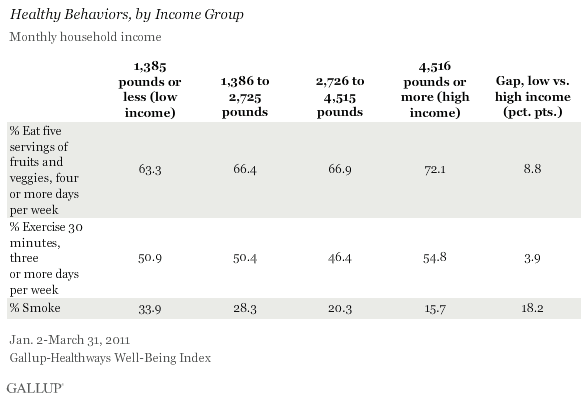
Low-Income Britons More Likely to Lack Certain Basic Necessities for Good Health
While all Britons have national health insurance coverage, those with lower incomes are more likely to lack access to certain basics important to good health.
Low-income Britons are slightly less likely to say they have a personal doctor and more likely to say that there have been times when they did not have enough money for healthcare or medicine than high-income Britons. Access to dental care, which the national health insurance doesn't cover, is also lower among low-income Britons. Six in 10 Britons in the lowest income group say they visited a dentist in the past year, compared with nearly 8 in 10 in the highest income group who report the same.
Low-income Britons are also less likely than high-income Britons to say they have easy access to affordable fresh fruits and vegetables and to a safe place to exercise. However, about 9 in 10 or more say they do have access to fresh produce and have a safe place to exercise.
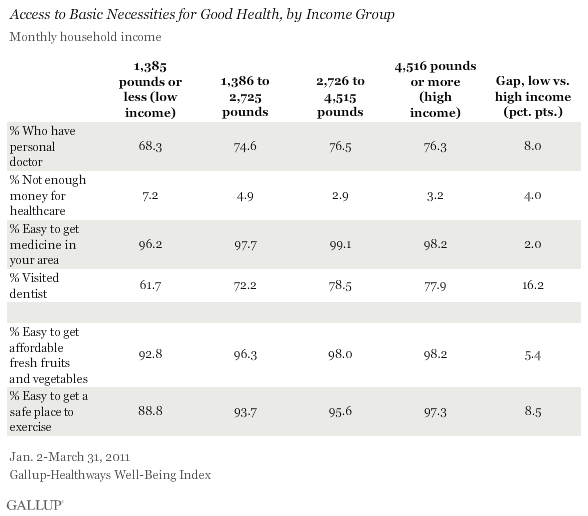
Low-Income Britons' Health Issues Affect Daily Life
Low-income Britons are also much more likely to report that health problems keep them from doing their usual activities and prevent them from doing things that people their age can normally do.
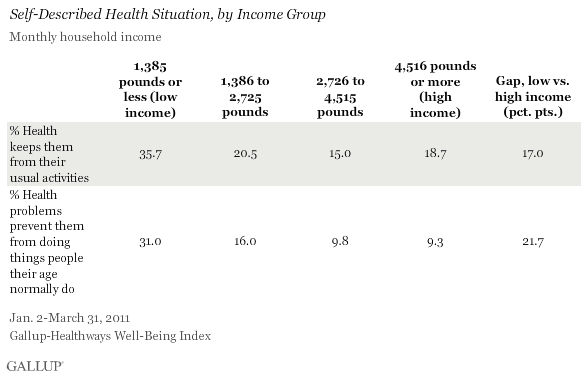
Bottom Line
The Gallup-Healthways Well-Being Index findings demonstrate the health and well-being divide that exists between the rich and poor in the U.K. Low-income Britons are more likely to have chronic health problems, less likely to practice good health habits, and slightly less likely to have access to certain basic necessities for good health. These interconnected issues could be the reason that low-income Britons are more likely to say health problems are an issue in their daily lives.
View all of the Gallup-Healthways Well-Being Index questions and the methodology.
About the Gallup-Healthways Well-Being Index
The Gallup-Healthways Well-Being Index tracks U.S. and U.K. well-being and provides best-in-class solutions for a healthier world. To learn more, please visit well-beingindex.com.
Survey Methods
Results are based on telephone interviews conducted as part of the Gallup-Healthways Well-Being Index survey Jan. 2-March 31, 2011, with a random sample of 4,000 adults, aged 18 and older, living in the United Kingdom, selected using random-digit-dial sampling.
For results based on the total sample of national adults, one can say with 95% confidence that the maximum margin of sampling error is ±1.8 percentage points.
Interviews are conducted with respondents on landline telephones and cellular phones. Each daily sample includes a minimum quota of 5 cell phone respondents and 29 landline respondents, with additional minimum quotas among landline respondents for gender within the region. Landline respondents are chosen at random within each household on the basis of which member had the most recent birthday.
Samples are weighted by gender, age, education, region, adults in the household, and cell phone status. Demographic weighting targets are based on the most recently published population data from the Census Bureau for Northern Ireland, Scotland, England, and Wales. All reported margins of sampling error include the computed design effects for weighting and sample design.
In addition to sampling error, question wording and practical difficulties in conducting surveys can introduce error or bias into the findings of public opinion polls.
For more details on Gallup's polling methodology, visit www.gallup.com.
